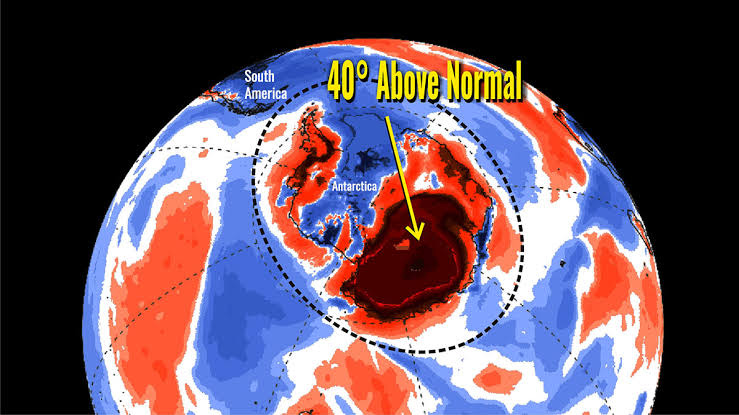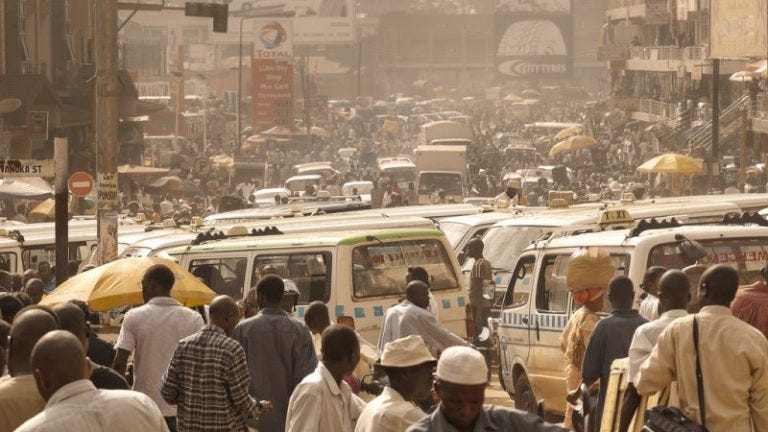Climate Change: Antarctica, Africa, Heatwaves
Do heatwaves get recorded in developing countries? Read to find out.
Credit: Severe Weather Europe
A few weeks ago, heatwaves skyrocketed in the Antarctica. Temperatures rose to never-before-seen heights. They climbed to new thresholds, sending panic into the mind of many people. They got to unprecedented levels, with words like “dramatic” and “alarming” and frightening” freely used to describe the situation. However, when heatwaves occur in the coastal areas of Nigeria, words like “alarming” or frightening” or “dramatic” never show up, because few monitoring of heatwaves occur, and few know when temperatures reach never-before-seen heights.
Credit: Climate Reanalyzer
Just as heatwaves skyrocketed in the Antarctica, it also skyrocketed to previous unseen-of levels in the Arctic. The same reaction took place. The same exclamations to the Antarctica event, same superlative words like “strange”, “incredible”, “astonishing” rang. The same apprehensions ran through the minds of many, over the 6 Fahrenheit higher-than-normal average temperatures, over the uncertainty about when the high temperatures in the Arctic would break. Yet, when Africa roasts in heatwaves, no one says “strange”, “incredible” or “astonishing”, and it as though nothing remarkable has happened,partly due to the fault of her scientists, and partly because of other reasons, as little monitoring happens about massive heatwaves that takes place.
Heatwave in Uganda, Credit: Weesam 2010 Flikr
The fact is, the coastal areas of Nigeria face problems. The coastal areas of “less-known” parts of Africa bring panic, because the monitoring of heatwave level doesn’t take place regularly. Coastal areas of many developing countries raise eyebrows, because unlike coastal areas in the developed world or the Arctic or the Antarctica, their heatwaves continue to bring hotter and more dangerous conditions, and respite might not be in sight, even if mankind somehow develops the capacity to keep global warming below 1.5C. Despite the prospects of hotter and more dangerous and more desperate state `of heatwaves in the coastal areas of Nigeria and other places in the global south, the monitoring of heatwave levels remains underreported.
“Lack of data is a roadblock,” said Friederike Otto, acting director of the University of Oxford Environmental Change Institute.
It’s a roadblock since heatwaves don’t get recorded. Weak governance prevents the recording of heatwave data in the less developed parts of the world. It hampers coordinated reporting, a legacy arising from a colonial experience. It halts the tracking of the impact of heatwaves, after colonialism destroyed and disempowered local cultures, slowing down scientific strides in the global south. It prevents or halts or slows down researches on heatwaves as related to places like the coastal areas of Nigeria, and since little tracking takes place in this part of the world, people suffer from a lack of heatwave data.
A research institute
Credit: The Guardian
Of course, scientists exist in these places to undertake the gathering of heatwave data, but they operate at a pace devoid of a bandwidth for research. Due to weak governance, lack of funding for research persists. Due to lack of funding for researches, psychosocial effects and loss of community memory take place, curtailing post-disaster assessments of heatwaves. Due to the lack of post-disaster assessment, climate change models don’t get drawn for the coastal areas of Nigeria and other places in the developing world, so inaccurate understanding of the extent of disaster from heatwaves occurs in research reports. Due to the combination of a lack of data collection and funding and post-disaster assessment, anguish and surprise and apprehension arise, and it’s difficult to be optimistic about the fate of millions of people in these places when they lack the bandwidth for research.
Credit: Wikipedia
Unfortunately, negative consequences rear their heads from this situation. According to scientists, Africa warms faster than the global average, faster than the Antarctica average, faster than the Arctic average. It gets hotter more quickly than other places in the world, so people must be exposed to heatwaves. Africa is considered the world’s hottest continent, meaning millions of its residents suffer in the effects of deadly heatwaves, and if people get killed, they get killed quietly and slowly. Africa regularly experiences high temperatures, so if its scientists for one reason or the order fail to record or tabulate or compile figures for its heatwaves, it can only mean danger for residents of a place that warms faster than the global average.
For example, if figures for heatwaves don’t get compiled in an accurate manner, voices of people in the coastal areas of Nigeria won’t be heard in the ongoing climate debate. If scientists for one reason or the other can’t get down heatwaves statistics, African voices would be muted during climate change discussions, and this could prove dangerous, since millions of Africans get impacted by heatwaves. If figures prove unavailable, voices of developing countries won’t be heard, and this breaks people’s heart, because these countries contribute less than the developed world to global warming. The voices of Africans and the developing world and other places are significant, because the owners of the voices belong to the category of the most vulnerable people to heatwaves, and they deserve to have their voices heard during climate change debates.
Credit: VOA
It can only get hotter. Scientists say it can only get hotter, with the biggest increases in heatwaves arriving from the Middle East, South America, and parts of Africa. Heatwaves can only get more dangerous, with some saying millions could be exposed to increased heat in African cities by the end of the century. With scientists in places like the coastal areas of Nigeria not compiling heatwave data, with people in Africa not in a position to conduct researches on heatwaves, with many others in the developing world facing the same situation, the impact of heatwaves can only become unpredictable, and the situation could be critical for such regions when all statistics say the world can only get hotter.
The impact of heatwaves could be unpredictable, particularly when few detailed heatwave information exist. It could be horrible, when few accurate critical heatwave surge estimates are available, when the capacity to produce such statistics is little. It could prove tiresome in the following years, when a surge of heatwave arrives, when the facts about heatwaves prove negligible, when the need for such critical and valuable and important information presents itself. It could be horrible, because with few accurate critical heatwave surge estimates or vital information or statistics, it means the government leaves residents in the affected areas unprepared for disaster, and they would be vulnerable to tragic circumstances as few detailed heatwave information exist.
Since few information exist, there can be no early warning system on heatwaves. Since early warning systems on heatwaves prove scarce, since the absence of detailed information persists, scientists can’t formulate climate models. Since the information on the direct impact of heatwaves on health are few, since detailed post-disaster assessments on heatwaves don’t exist, since the understanding of the extent of these heatwaves either doesn’t exist or isn’t considered important or has been neglected, residents in developing areas could find themselves facing serious challenges for survival. Seen within a context of rising temperatures in the next few decades, the lives of people in developing nations remain in jeopardy, simply because their leaders or scientists or policy makers refuse to provide information that could be useful towards the provision of early warning systems on heatwaves.
Lack of Early warning system
Credit: AMISOM PHOTO
To correct the situation, early warning systems should be introduced. They increase knowledge about heatwaves on a local level. They bring awareness about a local situation, enabling local communities to predict heatwaves. They build ideas about local extremes, and as temperatures rise, assist in halting scores of preventable deaths. Africa and some other developing countries occupy a unique place in the debate on heatwaves, since experts recognize them as the hottest places on earth, so such unique places should have early warning systems introduced.
Increased collaboration helps: collaboration between local researchers and health centers, collaboration between health centers and research institutes, collaboration between research institutes and government departments. The effort locates the challenges caused by extreme heat. And since the efforts involve the sharing of information derived from early warning systems, they identify the solutions to challenges brought by extreme heat, as the impacts of heatwaves will be properly tackled. The problem of coordination becomes a thing of the past, as the efforts will analyze information from many areas related to challenges brought by extreme heat, and with the collaboration of hospitals and epidemiologists and researchers, places like the coastal areas of Nigeria, Africa in particular, and the developing world in general, will find help.











Thank you for reporting on this. There is certainly a disparity in the reportage of climate change impacts. We need to shift from focusing mostly on the polar regions and educating the world about where the impacts will be felt hardest.